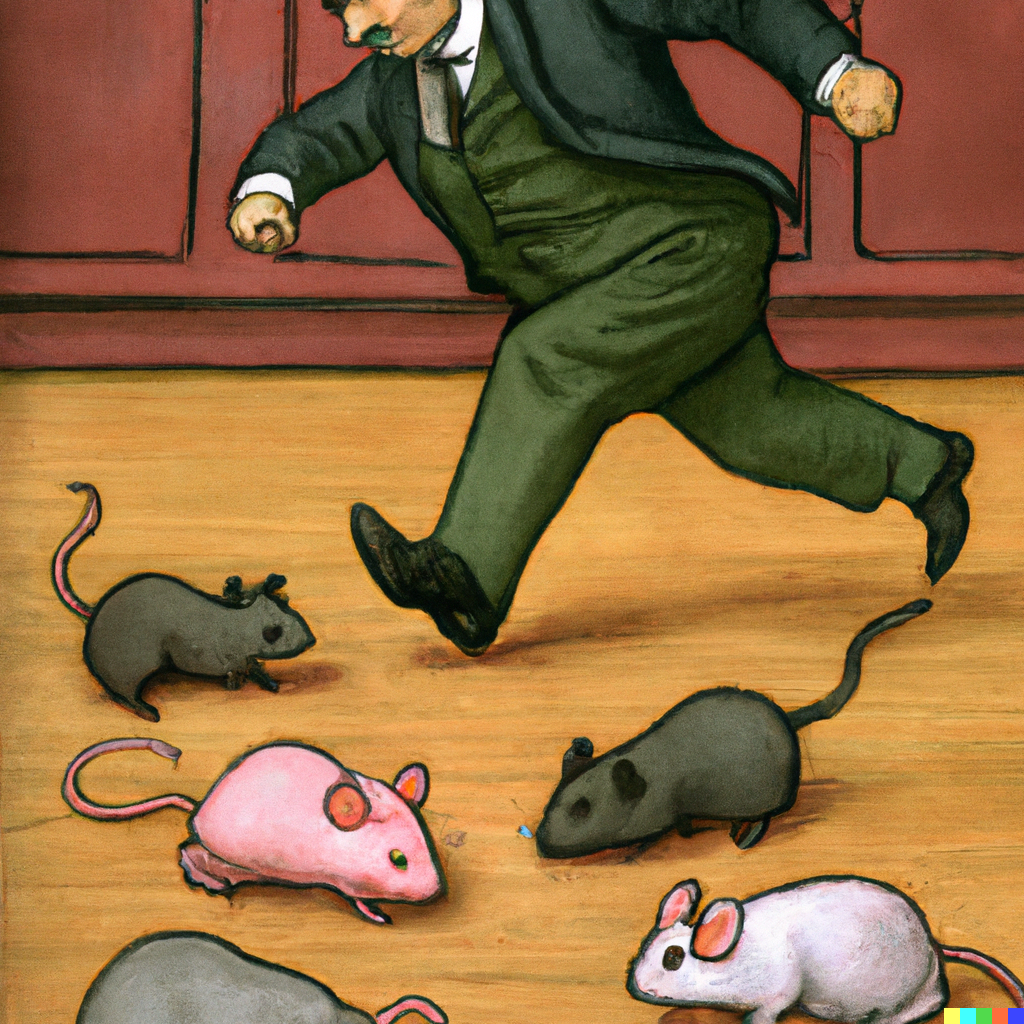Of Mices and Mises

You say Mises, I say Mices.
I’m sitting across the table from a long time member and leader of the Libertarian Party, and for the third time in about an hour he has mispronounced the word “Mises”. He’s not an academic nor is he someone I’d expect to be reading deeply in Austrian economics, so I politely say to him, “You know it’s pronounced “Mises,” and he chuckles, smiles, nods and says, “Oh Pat I know; I just like getting under the skin of those folks.”
“Those folks” are the new leadership team of the national Libertarian Party, the so-called “Mises Caucus.” In a raucous 2022 national party meeting the caucus took over the party and has since fractured it. The Mises Caucus chose its name to honor the famous economist, but also to identify with the Mises Institute in Auburn, Alabama. The institute was founded after another falling out within the LP in the 1980’s between the Murray Rothbard/Ron Paul wing of the party and the David Koch/Ed Crane wing. And much like today’s conflict, this one occurred after an election in which the LP had two wings at odds over whether it should pursue electoral success at the expense of ideological purity.
In the 1980 election Ed Clark and David Koch garnered a little over 1% of the national vote, a record to be later broken in 2016 by Johnson and Weld. But in both instances the more radical elements in the party derailed the potential for momentum. Candidates like Bill Weld ruffled feathers, particularly at the end of the 2016 campaign when he called on voters to support Hillary Clinton over President Trump. Members of the Mises Caucus were frustrated by what they saw as watering down core libertarian principles for the sake of short term political opportunism.
My lunch companion and I are starting with some spring rolls and iced tea. In between bites of the crunchy, hot starters my friend explains how he thinks about the differences in the flavors of libertarianism espoused by the two groups. Of course he’s more sympathetic to his own position; he believes that while he is a “live and let live” libertarian who can broaden his message to a larger audience, the Mises Caucus represents a younger and more ideologically inflexible “don’t tread on me” group. In his view, this group has become unnecessarily antagonistic towards any concessions to make the party politically palatable beyond a small group of hard core believers.
The Mises Caucus is led by Michael Heise, and other notable public figures include the lightning rod Angela McArdle as well as the prominent comedian Dave Smith, who has an extensive social media presence. They cite longtime LP influences Ron Paul, Murray Rothbard, and historian Tom Woods among their supporters and role models. In a nod to the Austrian economist who is their namesake, the caucus’ web page asks individuals to “Take Human Action” in promoting liberty through the LP.
This wing of the party is not some Johnny-come-lately group that never was part of the LP. In fact, the party has never been unified or particularly consistent in the views it espoused or issues it promoted. But the party has been consistently successful in the institutional strategies of keeping the diverse interests together and keeping the party on the ballot in all 50 states for national elections.
The LP is really a bunch of different groups, not merely one party. Each state has its own state level party. And the state organizations are now more or less aligned on one side or another of this divide. So while New Hampshire is now run by staunch supporters of the Mises Caucus, Louisiana is still controlled by the Old Guard. You can tell the differences by looking at the social media accounts for both groups that seem like they are from different planets from time to time, let alone the same philosophical traditions. During Nikki Haley’s recent misstep about the cause of the Civil War, the old guard wings of the party chided her and agreed that slavery was the root cause. The Mises Caucus social media outlets cited controversial studies by historians who blame Lincoln for a war of national government consolidation. Academic debates in libertarian circles are never dull.

What prompted the Mises folks to launch their hostile takeover and storm the Bastille? In order to understand I reached out to Steven Nekhaila, who has supported the caucus during the past several years. He’s been on the LP national board since 2016 and before that was part of the board of the Florida state party, so he has seen the LP at the national and local level change and evolve. In his view, the Mises caucus was initially motivated by a more wonkish group of activists trying to improve the party. He sees new energy and youth in the group of leaders and is excited by the influence of social media personalities like Dave Smith, who has more than 400,000 followers on Twitter/X.
Nekhaila believes that the LP has always had a broad appeal because individuals on the left and right find a home in it. In his view, the current emphasis of the Mises Caucus is on war and economics, which he believes has attracted a younger group of followers to both the party and the writings of people like Rothbard, Paul, and Mises. He sees these new, younger activists as energized and enthusiastic, but in need of assimilation to the world of politics.
In the wake of the Mises Caucus ascension, I asked him how the party could mend fences and move forward? He notes that as Florida state chair he saw a lot of new folks come in and earn the respect of party veterans. The Florida state LP board is mixed with both Old Guard and Mises folks, but they have managed to get the personalities to mesh. He acknowledges that things were tense at the start, but he believes the party has to set those differences aside and work together. Nekhaila would like to see a memorandum of understanding on process between the two groups to help align goals and objectives. Coming from a business background he says bluntly, “We don’t have to love each other to get things done.” Considering the relative level of tension nationally, that is certainly a laudable goal.
And a quick visit to the Florida LP Twitter/X account confirms that. It’s a mix of mainstream libertarian positions, such as a retweet from a recent Reason article supporting immigration along with more radical tweets about Jan 6th and attacks on Bill Clinton’s links to Jeffrey Epstein.
Nekhaila believes that ultimately all libertarians, even the Mises caucus, get tired of losing, which leads to the temptation to support pro-liberty Republicans to scratch that itch. But he rejects that approach by maintaining a more “orthodox” libertarianism and supporting some ideological boundaries. He’s not worried about anyone in the LNC or the Mises Caucus, but is concerned about Colorado, where they are working with Republicans.
I ask him if it’s the party’s job to run candidates to change policy or promote the philosophy of the party. He says they have to do both – explain the underlying philosophy and build the infrastructure. He argues both are necessary because in his business and political experience he sees an increase in self-identification libertarianism among younger employees, but little understanding of the philosophical underpinnings. How exactly the party will manage to accomplish that is another matter.
And he believes that the Old Guard lost sight of that philosophy, particularly the writings of Ron Paul who he believes provided “a wider vision and energy”. According to Nekhaila, the influx of Mises supporters is a positive development overall and a needed one. But the challenge now is to create a social movement that attracts voters. He argues neither the Democrats or Republicans are doing that now and it’s a gap that the LP can fill with its new converts. He is a business person who employs a lot of younger workers, and he sees a growing popularity of those ideas among that generation. That’s part of the reason he supports a more orthodox approach to political work.
Is Nekhaila’s optimism and professional experience capable of rebuilding bridges with the Old Guard? We turn to that question in the next installment.
